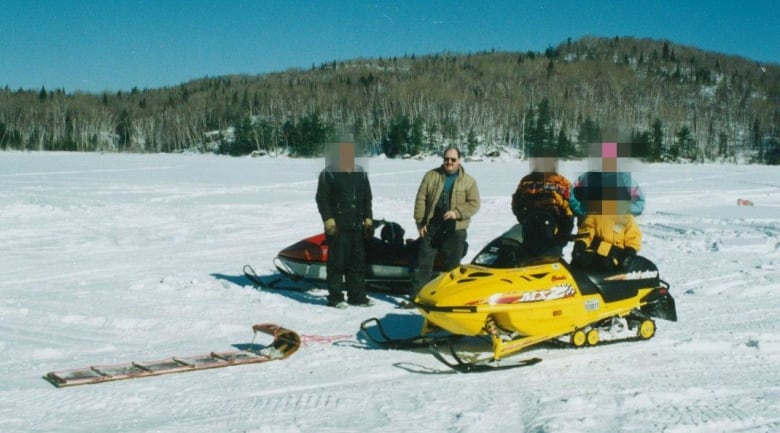Who is Richard Bain, the Parti Québécois rally shooter?
Man in bathrobe, shouting about anglophone rights, was unrecognizable to friends, family

Quebecers know Richard Bain as the man in the bathrobe who gunned down a man just outside the sovereignist Parti Québécois electoral victory party the night of Sept. 4, 2012.
If his gun hadn't jammed, Bain could have fired 30 rounds in less than a minute, then walked mere metres from the backstage entrance to the platform where premier-designate Pauline Marois was delivering her speech.
But the man who shouted about anglophone rights as he was led away in handcuffs was unrecognizable to his friends and family.
CBC News tells the story with exclusive photos from Bain's family:

So what happened? How did he go from being "Rick," the joker at work and beloved younger brother, to the murderer who made plans to kill as many separatists as possible?
CBC News has a look at the life of Richard Bain and who he was before the deadly night at the Metropolis concert hall in downtown Montreal.

Playing hockey, growing up in Saint-Michel
Richard Bain was born on Sept. 8, 1950 and grew up in Montreal's Saint-Michel neighbourhood, playing hockey and other sports with his two older brothers, David and Robert.
"It didn't matter if you were anglophone or francophone, we all played together," brother Robert Bain recalled during court testimony.
They weren't a very religious family, although Richard Bain remembers going to an Anglican church once during his childhood.
Their father was the quiet type, he said — he'd been severely wounded by shrapnel during World War I and rarely spoke to his children or showed them affection.
"I saw his back once when I was a kid, Bain said in court.
"There was no flesh that hadn't been burnt. There was nothing but scar tissue."
The family patriarch was ill for most of the boys' childhood and retired at a young age. He was "not really there, he didn't come to our games with us," Bain told a court-appointed psychiatrist.
It was left mostly up to his mother to raise Bain and his older brothers.

It was around the age of 23 that Bain first took an interest in hunting and firearms, which eventually grew into a lifelong hobby.
His uncle owned a farm, and Bain loved to visit once a year to hunt groundhogs with his .22-calibre rifle.
He graduated to larger game in the 1970s and started to hunt deer and moose.
He loved to fish, too, and after his retirement, he turned it into a full-time business.

'Rick' the foreman
In his 20s, Bain became a foreman at the CCR copper refining and processing plant in Montreal East.
He stayed on for 33 years and was "one of the best," according to an employee who testified during the trial.
"Rick" — as he was known at work — played on the company hockey league and was nicknamed "grandma" because he was older than the other players.
He enjoyed and even encouraged that type of teasing.
"If there was a party, I would be the clown," Bain said in his court testimony.

2009: When it all unravelled
Richard Bain was married to his work for most of his life, living with his brother David and his mother in the family's home well into adulthood.
In the late 1980s, he met Jocelyne Rivest and found, in her, a long-term partner.
They eventually became serious enough to move in together and shared a home in Repentigny, Que.
Rivest told police that while Bain was sometimes stubborn and opinionated, he was never violent and, in fact, was very kind.
But it all changed in 2009.
Looking back now, friends and family pinpoint that year, when he retired from his job as a foreman, as a turning point.
"That's the year Richard went on Cymbalta and completely changed," brother David said during the trial, referring to the medication prescribed to treat Bain's depression.
David Bain said his brother became "like a hermit out in the bush."
During the H1N1 flu outbreak in 2009, Richard Bain became convinced the virus would bring about the downfall of society and world order
He broke off his 20-year relationship with Rivest and moved full-time to his remote cabin in La Conception, hoping to fulfil his dream of living by the lake and becoming a fishing outfitter.
"She [Rivest] says it, and I say it to this day, that we would still be together if I had not been taking Cymbalta," he told the jury during the trial.
'I wish we could go back in time'

The man who had been a workaholic and rarely went out found himself single and dropping hundreds of dollars a night on strippers, limousines and champagne.
Sometimes he'd pay strippers for sex, as well.
Things started to look up at the end of 2009, when Richard's family doctor switched him to a new medication.
By 2012, Richard seemed to be on the road to recovery, focused on building up his fishing lodge business, stocking the lake with rainbow trout.
It was paying off — he was hosting tourists from around the world.
Brothers David and Robert thought everything was going so well.
Neither of them realized, when they saw the images of the PQ rally shooter being led away in handcuffs on TV, that they were looking at their brother.
"I had no idea it was him at all. None," Robert Bain told police.
"I couldn't believe he could do something like this. It's not in his nature."
Four years after that deadly night, Robert and David Bain are still struggling to understand what happened to their little brother.
"I still love him, but I wish we could go back in time," David Bain said, breaking down. "I feel for him. I feel for the family and friends of the victims."
"It's tragic."


